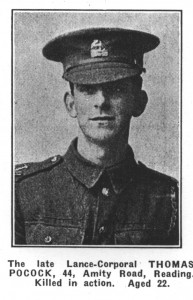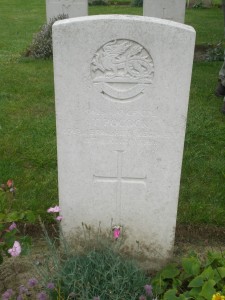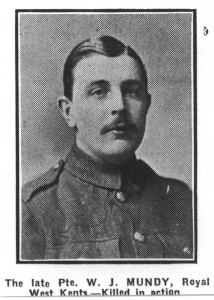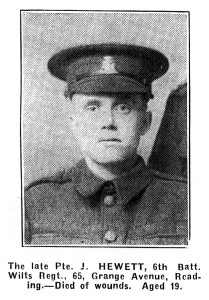Thomas Pocock
Private 43323
2nd/9th Battalion Manchester Regiment
Division 39
 |
 |
Thomas Pocock lived at 44, Amity Road, Reading. He was the son of Thomas and Mary Pocock. The 1911 census indicates that he had two older brothers Albert and Harry and one younger brother Ernest Frank who were living in the family home. His mother had given birth to ten children of whom seven were living. Thomas was a labourer at the biscuit factory like his father and older brothers. He was aged 22 when he was killed in action on 9th October 1917. This day marks the beginning of the third phase of the Third Battle of Ypres.
Passchendaele by Martin Matrix Evans describes the scene that Thomas Pocock would have been a part of: “..troops moved up in anticipation of the attack of 9 October. Lieutenant P. King described the horrors of the march up from Ypres. ’It was an absolute nightmare. Often we would have to stop and wait for up to half an hour, because all the time the duck boards were being blown up and men being blown off the track or simply slipping off – because we were all in full marching order with gas masks and rifles, and some were carrying machine guns and extra ammunition’.
At 5.20am on 9 October the 2/9th Manchester Regiment and the 2/4th East Lancashire (both 198 Brigade, 66th Division) advanced against Dab Trench. Fire from Hamburg Redoubt, the strong point in the centre of the obstacle, cut the men down and an attempt by the 2/5th East Lancashire to take it failed. King describes it. ‘We went over this morass, straight into a curtain of rain and mist and shells, for we were caught between two barrages. Well, of course we lost direction right away….The machine gun fire from the German positions was frightful…. We could hardly move because the mud was so heavy that you were dragging your legs behind you, and with people being hit and falling and splashing down all round you, all you can do is keep moving and look for some form of cover’.”
It is not therefore surprising that Thomas Pocock has no known grave. He is commemorated on the Tyne Cot Memorial Panel 120-124 and 162-162A and 163A

